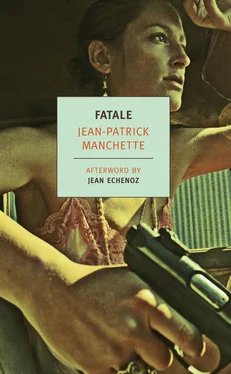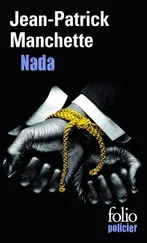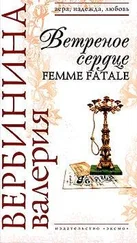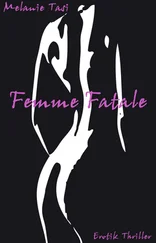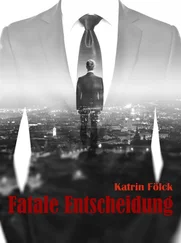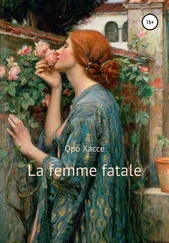Jean-Patrick Manchette - Fatale
Здесь есть возможность читать онлайн «Jean-Patrick Manchette - Fatale» весь текст электронной книги совершенно бесплатно (целиком полную версию без сокращений). В некоторых случаях можно слушать аудио, скачать через торрент в формате fb2 и присутствует краткое содержание. Год выпуска: 2011, ISBN: 2011, Издательство: New York Review Books, Жанр: Криминальный детектив, на английском языке. Описание произведения, (предисловие) а так же отзывы посетителей доступны на портале библиотеки ЛибКат.
- Название:Fatale
- Автор:
- Издательство:New York Review Books
- Жанр:
- Год:2011
- ISBN:978-1-59017-572-9
- Рейтинг книги:5 / 5. Голосов: 1
-
Избранное:Добавить в избранное
- Отзывы:
-
Ваша оценка:
- 100
- 1
- 2
- 3
- 4
- 5
Fatale: краткое содержание, описание и аннотация
Предлагаем к чтению аннотацию, описание, краткое содержание или предисловие (зависит от того, что написал сам автор книги «Fatale»). Если вы не нашли необходимую информацию о книге — напишите в комментариях, мы постараемся отыскать её.
Fatale — читать онлайн бесплатно полную книгу (весь текст) целиком
Ниже представлен текст книги, разбитый по страницам. Система сохранения места последней прочитанной страницы, позволяет с удобством читать онлайн бесплатно книгу «Fatale», без необходимости каждый раз заново искать на чём Вы остановились. Поставьте закладку, и сможете в любой момент перейти на страницу, на которой закончили чтение.
Интервал:
Закладка:
“Well, it’s the same as ever, isn’t it? It seems slow, but actually it is quite fast. Sex always comes up first. Then money questions. And then, last, come the old crimes. You have seen other towns, my sweet, and you’ll see others, knock on wood.” She tapped her head. In the mirror, poorly illuminated by the fluorescent lighting built into the bathroom cabinet, her white reflection likewise tapped its head without smiling. “Come on, my sweet,” she repeated, “the crimes come last, and you have to be patient.”
She drank her tea and went to bed and slept soundly.
8
Over the next three weeks Aimée got into a routine. Accompanied by Maître Lindquist, she viewed several properties that were for sale in Bléville and the surrounding area. Each time she wavered, but was so charming that the realtor could not hold her rejections against her; on the contrary, he was more and more willing to humor her every whim.
Aimée’s life was well ordered and well filled. She took tea in the morning, lunched on grilled meat at the Grand Café de l’Anglais, and had eggs or soup for dinner. The moment seemed far off when she would once more crave a choucroute. (Her weight had dropped to forty-five kilos. It was always like that when she was focused.) In the daytime she mingled with the local elite and made connections. Twice a week she went horseback riding at a country club, three times a week she played tennis. She also golfed, and on Friday nights she went to the casino, where she gambled very little. Twice a week, too, she honed her martial-arts skills at the Jules Ferry Center, a place where the elite were never to be seen. (She familiarized herself with the nunchaku , a weapon hitherto unknown to her.) And she became well known to the well-to-do of Bléville, and they to her. She observed their manners and customs, and especially the tensions and passions that existed amongst them; she observed them ceaselessly, attentively, patiently.
In the evenings, in her studio apartment, she made notes or added to earlier ones on record cards of some kind. She wrote with a small green fountain pen with a gold nib, using violet ink, and she moved her lips as she wrote.
Returning after a game of bridge or a long conversation with the voluble Christiane Moutet, she would write such things as: Sonia Lorque had a foul life before she met Lorque. Mixture of gratitude and love. A solid couple, more solid than either thinks. Or else she might write: They say that L and L controls the construction business Géraud and Sons, which built the fish market. No competitive bids invited.
When she finished writing, she would reread her notes several times before tidying them away in one of the drawers of the chest.
During the third week after Aimée’s arrival in Bléville, the young woman left town briefly. She took the train one evening, arrived in Paris before midnight, changed stations by taxi, and caught another train. She had her slim attaché case and a large Delsey vanity case she had bought in Bléville. She had not reserved a seat on the train, but there were few travelers at that time of year, and she easily managed to find a comfortable spot.
About five thirty in the morning her train stopped for three minutes in a small town in the center of France. Aimée got off, walked out of the long gray railway station, crossed the Place de la Gare, and awoke the night man at the Grand Hôtel du Commerce et des Étrangers. At this time she was wearing a flowered dress beneath her coat and an opulent auburn wig. She took a room, awaking automatically at eight thirty as she had intended. She had rather good command of her body. At an earlier stage of her life she had been alienated from it in many ways. In particular, she could not get to sleep without a strong dose of barbiturates, nor wake up properly without a strong dose of stimulants, nor for that matter put up with her husband and the rest of her existence without quantities of appetite suppressants and tranquilizers, not to mention glasses of wine. But these days all that had changed. Aimée had control over her body; she had fallen asleep instantly and she woke up at the time of her choosing.
She showered, put her wig back on, and picked up the room phone. Croissants and hot chocolate were brought up to her. She ate heartily. Her demeanor had changed. A little later, smoking a menthol cigarette, she telephoned her financial adviser.
“Madame Souabe, what a marvelous surprise!” cried Maître Queuille when they met at the hotel for an aperitif and dinner together. “You haven’t changed at all, how wonderful!”
“Nor have you, Roland,” replied Aimée.
They talked business. They examined operating accounts and extracts from the land registry. Aimée gave the accountant sixty thousand francs that she had brought with her.
“Always cash! Highly suspect, I must say,” joked Maître Queuille without malice.
He wrote out a receipt. He remarked that his sister had spent the month of September in England with her husband. The couple had not, however, been lucky enough to see Aimée on British television. The adviser asked Aimée, whom he continued to address as Madame Souabe, whether she had any thoughts of returning to France and finding work here. Aimée answered that she had grown accustomed to living and working in England.
“Well, of course,” said Maître Queuille. He only half believed that this young woman was an actress in Great Britain, as she claimed, and he was even less convinced that she appeared in television commercials. Maître Queuille had a lively, prurient imagination. He rather suspected that his client was in fact a call girl.
A while later Aimée and the adviser exchanged smiles and parted company. Aimée ran a few errands, then boarded a Chausson country bus. During the eighteen-kilometer ride, she browsed through a local newspaper. For quite some time now she had stopped buying the Paris papers. But in this local sheet she suddenly came upon the information she had searched for in vain in the national press two or three weeks earlier. DEADLY HUNTING read the headline of a short piece on a bloody accident in which the father of a family was killed and his two sons wounded. This , concluded the article, brings to a total of six the number of victims of hunting accidents since the beginning of the month. On the 2nd, M. Morin and M. Cardan shot each other in the vicinity of Saint-Bonnet-Tronçais (Allier). Two days later came the sad news from eastern France that M. François Roucart, a stock breeder, had been killed by a hunter not only inept but as yet unidentified. Are we heading for a time when hunting is more lethal to humans than to game? It is a fair question.
Aimée kept the paper when she got off the coach in a village of two or three hundred souls. She walked through the village and started up a rock-strewn path angling up a hillside. The sky was gray and stormy. Aimée covered some four or five hundred meters. She kept wrenching her ankles on the rocks. She was sweating, even though the temperature was no more than eight or nine degrees above freezing and she was hardly well bundled up.
She entered a hamlet at the edge of a wood of oak and beech. Pushing open a small metal door she came into the sandy courtyard of a stone house. Lichen and moss covered the walls. The doorway to the house was open. Aimée stood on the threshold and looked around the main room with its dark-purple tiled floor. In the half darkness she could make out a stove, a heavy table covered with an oilcloth, and a large bed piled high with eiderdowns and adorned with shiny copper fittings. A plate, a glass, silverware, and a saucepan were drying by the sink on a draining board of blackish stone.
Aimée turned around. From the doorway she looked down over the vegetable garden that sloped away from the house beyond the sandy courtyard. Down in the valley the village could be seen beneath the gray sky, and fat white cows grazed in garishly green fields. Truck farms bordered a river. In the middle of the vegetable garden sat a woman in a straw hat, her back to the house. Aimée went down the three front steps and approached her.
Читать дальшеИнтервал:
Закладка:
Похожие книги на «Fatale»
Представляем Вашему вниманию похожие книги на «Fatale» списком для выбора. Мы отобрали схожую по названию и смыслу литературу в надежде предоставить читателям больше вариантов отыскать новые, интересные, ещё непрочитанные произведения.
Обсуждение, отзывы о книге «Fatale» и просто собственные мнения читателей. Оставьте ваши комментарии, напишите, что Вы думаете о произведении, его смысле или главных героях. Укажите что конкретно понравилось, а что нет, и почему Вы так считаете.
